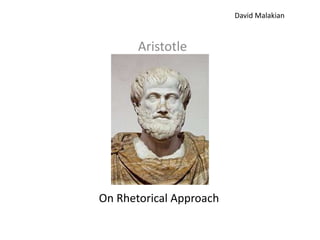
Aristotle
- 1. David Malakian Aristotle On Rhetorical Approach
- 2. • Aristotle was a philosopher and was a student of Plato • Aristotle's philosophy of argument is embodied in his Rhetorical Approach. • Aristotle's book THE RHETORIC is generally considered the most important single work in the literature of the speech discipline.
- 3. • The Rhetorical approach may be described as a process for discovering all of the available means of artistic persuasion on any subject.
- 4. Aristotle believed that through the use of the rhetorical process: • Truth and justice may be guarded against falsehood and wrong. • Debate may be conducted on subjects in the absence of absolute truth. • Both sides of a claim may be presented. • Proof to establish the probability of a position may be developed.
- 5. • Aristotle's persuasion involves the use of three elements of proof
- 6. Logos • Means logic and is the use of reason to support a decision. Logical appeals essentially present the situation, the alternatives, and the set of probabilities involved in the decision making process. Such appeals are direct to our minds reasoning capabilities. Think logically
- 7. Pathos • Means emotion and is the appropriate use if emotional and motivational appeals to support a decision. Emotional appeals are directed to the wishes, wants, desires, goals , and needs of the person whose acceptance is desired. Such appeals are directed to the heart. A good arguer limits the role emotion plays in argument.
- 8. Ethos • Refers to the use of source credibility to support a conclusion. Aristotle perceived ethos as a powerful proof supplied by the source himself, and through which judgments could be made about his character, wisdom, and goodwill.
- 9. • Aristotle wrote " persuasion is achieved by the speakers personal character where the speech is so spoken as to make us think him credible. We believe good men more fully and more readily than others; this is true generally whatever the question is, and absolutely true where exact certainty is impossible and opinions are divided. this kind of persuasion, like the others, should be achieved by what the speaker says, not by what people think of his character before he begins to speak."
- 10. • Ethos is thus the image of the source held In the minds of the audience. Source credibility can be developed in two ways. • Initial Ethos • Derived ethos
- 11. Initial Ethos • Initial Ethos: is Based on the arguers credentials, status, reputation as known to the audience before they hear or read the content of the message. • Hint: Advertisers have increasingly turned to "positive image makers" to sell their clients products. The idea is if you like them, you will be favorably disposed toward the product they are endorsing.
- 12. Derived Ethos • Derived ethos: this type of ethos results from what is said in the message- the quality of the logos and pathos used to get the arguments accepted. This approach works best when the credibility of the sender is unknown to the audience at the outset of the speaker’s presentation.
- 13. Conclusion • Aminimal level of positive ethos is necessary for logical and emotional proofs to achieve effectiveness. Low credibility sources cannot use high levels of emotional appeals effectively, because the audience doesn’t believe in the source in the first place. Like wise, lacking a certain minima ethos, logical proof will be ignored, because the source is not perceived as a person who is trustworthy.